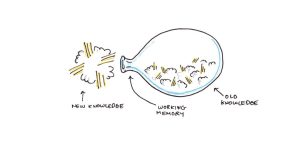Sometimes, reading a good book is enough
Everyone knows that knowledge is power.
Few people know how much knowledge you can gain solely from books.
That’s right — solely from books. The truth is you don’t have to buy dozens of expensive courses or sit in boring lectures in order to educate yourself.
That’s not to say that all courses are a waste of time and money of course — I’ve met some incredible and helpful professors and instructors throughout my life. It just bothers me that people tend to underestimate books and their power to expand your mind and knowledge.
Personally, I’ve learned far more things from books than I did from the lectures I attended in university or the online courses I’ve bought throughout the years — which brings me to the following list of books.
Each of the following books was educating, enlightening, and all broadened my knowledge on a range of topics and fields without me having to spend thousands of dollars on monotonous webinars and boring instructors.
Without further ado, let’s dive right in.
Genre: Science/Psychology
Length: 338 pages
Rating on Goodreads: 3,90 stars
If you sit down and think about it, our Internet browser and the things we search on Google can reveal a lot of information about our personalities.
And, if we’re being honest, we lie a lot less online than we do in real life.
With this idea in mind, this book’s author explores how statistics and big data can give answers to almost all of our questions and how they can reveal that many people are not really who they say they are.
The book contains various charts and graphs, based on people’s searches on sites like Google, Facebook, and even Pornhub, revealing a wealth of information about their fears, worries, and preferences, that wouldn’t be made known otherwise — since, you know, most of us are embarrassed to tell the truth when someone asks us directly in real life.
Both concise and rich, Everybody Lies is a great, easy-to-read exploration of the power of data analytics, and a thought-provoking analysis of human behavior.
“I am now convinced that Google searches are the most important dataset ever collected on the human psyche.”―Seth Stephens-Davidowitz, Everybody Lies
“Until now, that is. This is the second power of Big Data: certain online sources get people to admit things they would not admit anywhere else. They serve as a digital truth serum.”
― Seth Stephens-Davidowitz, Everybody Lies
Genre: Self-Help/Relationships
Length: 232 pages
Rating on Goodreads: 4,26 stars
Relationships are a crucial part of our lives and learning to navigate love, attachment, and long-term partnerships is essential for a fulfilled life.
This short, clear, and insightful guide on love languages is a great start.
It starts with the argument that people communicate differently (have different love languages) and that miscommunication is often the reason relationships fail.
Then, it breaks down the five love languages we use, which are basically five different ways we give, express, and receive love. If you learn what your partner’s love language is, you already know how to make them feel loved, and boom! — you have laid the foundations for a strong, long-lasting relationship.
I think that the ideas presented in this book will benefit any present or future relationship of yours.
“The best thing we can do with the failures of the past is to let them be history.”
― Gary Chapman, The Five Love Languages“In fact, true love cannot begin until the in-love experience has run its course.”
― Gary Chapman, The Five Love Languages
Genre: Science
Length: 256 pages
Rating on Goodreads: 4,30 stars
Man, reading this book was a rollercoaster. I don’t know if it was just me but I found some parts of it somewhat difficult to read/understand — I had to go back and re-read sentences multiple times.
Maybe I’m a dummy when it comes to science.
Nevertheless, it’s one of those books that are definitely worth the challenge of reading them — it genuinely expands your knowledge of cosmology and astrophysics and gives answers to some truly big questions (such as if God truly exists or if we could ever go back in time).
What makes this book great isn’t just Hawking’s enlightening analysis of complicated issues but his witty writing and incredible sense of humor.
I had no idea Hawking was so funny neither did I ever imagine that a science-related book would make me giggle. If you often spend time contemplating questions about the universe and your own existence, you’ll appreciate the answers in this book.
“So remember to look up at the stars and not down at your feet. Try to make sense of what you see and wonder about what makes the universe exist. Be curious. And however difficult life may seem, there is always something you can do and succeed at. It matters that you don’t just give up. Unleash your imagination. Shape the future.”
― Stephen Hawking, Brief Answers to the Big Questions“While there’s life, there is hope.”
― Stephen Hawking, Brief Answers to the Big Questions
Genre: Science/Psychology
Length: 307 pages
Rating on Goodreads: 3,88 stars
You’d be lying if you said the book’s title and cover didn’t already grab your attention!
Despite its title, the book has nothing to do with Einstein — it’s all about human memory. The truth is, my memory absolutely sucks, so I was intrigued by the chance to improve it — and the book actually helped me with that.
The author explores the history of memorization, various mnemonic techniques, and his own yearlong quest to improve his memory and become a “mental athlete”.
Now, if you’re wondering why would you want to read a book about human memory, here’s my answer: considering we are pretty much the sum of our memories and that, the more we remember about the world around us, the better we are at navigating it, why wouldn’t you?
“Monotony collapses time; novelty unfolds it. You can exercise daily and eat healthily and live a long life, while experiencing a short one. If you spend your life sitting in a cubicle and passing papers, one day is bound to blend unmemorably into the next — and disappear.” — Joshua Foer, Moonwalking with Einstein
“It is forgetting, not remembering, that is the essence of what makes us human. To make sense of the world, we must filter it. “To think,” Borges writes, “is to forget.” — Joshua Foer, Moonwalking with Einstein
Genre: History/Politics
Length: 256 pages
Rating on Goodreads: 4,20 stars
If you’re interested in getting to know a bit more about politics, history, and geography, this book combines all three in a comprehensive and engaging way.
It takes you on a journey through the world and an exploration of geopolitics and geopolitical strategies by using ten maps of crucial regions like Russia, the USA, and China.
The main point of the book is the following: all leaders of nations are constrained by geography. As to why, how, and to what extent — you’ll have to read the book to find out.
“What is now the EU was set up so that France and Germany could hug each other so tightly in a loving embrace that neither would be able to get an arm free with which to punch the other.”
― Tim Marshall, Prisoners of Geography“Technology may seem to overcome the distances between us in both mental and physical space, but it is easy to forget that the land where we live, work and raise our children is hugely important, and that the choices of those who lead the seven billion inhabitants of this planet will to some degree always be shaped by the rivers, mountains, deserts, lakes and seas that constrain us all — as they always have.”
― Tim Marshall, Prisoners of Geography
Genre: Science/Mathematics
Length: 480 pages
Rating on Goodreads: 3,96 stars
Raise your hand if you hated maths at school.
If you ask me, it was my absolute nightmare — but this book made me look at it in a whole new light.
The author starts by explaining that maths is pretty much everywhere we go, underneath everything we do, and then, through a wealth of information and examples, he demonstrates how you can use the tools of mathematics in order to understand the world better and make your life easier.
To be honest, I expected the book to be pretty dull, but was engaging, enlightening, and at parts, hilarious. Plus, it covered a wide range of interesting topics — from politics and military history to gambling and morality.
If only they taught that kind of maths at schools.
“Knowing mathematics is like wearing a pair of X-ray specs that reveal hidden structures underneath the messy and chaotic surface of the world.”
― Jordan Ellenberg, How Not to Be Wrong“Mathematics is the extension of common sense by other means.”
― Jordan Ellenberg, How Not to Be Wrong
Thank you for reading! If you liked these book recommendations, consider subscribing to my monthly book newsletter! It’s free, and each month you’ll get book reviews, book recommendations, and reading tips!
If you enjoy reading stories like these, consider signing up to become a Medium member and get unlimited access to my and other incredible writers’ stories on Medium. If you sign up using my link, I’ll earn a small commission. Thanks!


